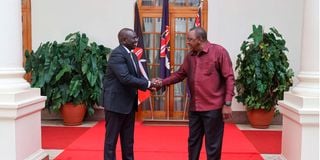Premium
Of Uhuru-Ruto battles and Shakespearean drama

Former President Uhuru Kenyatta receives President William Ruto at State House, Nairobi on September 11, 2022.
What you need to know:
- The two former friends are now feuding and Shakespeare would have had a lot to say about this.
- A tale to be told in which nobody comes out well.
“Now I am alone”, so said Hamlet in Shakespeare’s Hamlet, but these words could have been recently said by former President Uhuru Kenyatta — who seems to have been abandoned.
The fairy tale is over, the line has been cut — and he has somehow wilted politically since he retired. He may now be feeling brushed off like spices off the edge of a knife.
This was inevitable, sooner or later, like a delayed-action bomb that would ultimately detonate, blast after deadly blast. Kenyan politics is both dangerous and familiar, repulsive and attractive, grotesque and alluring.
The battle between former President Uhuru Kenyatta and President William Ruto started with ironic words, hints and nuances but gradually moved to riskier regions over time and now — up close and personal — a blazing, horrible, bitter row.
The former president finds himself in unfamiliar territory; the shoe is on the other foot.
A few months ago, he was the occupant of State House, when things were probably magical: a wholesome, orderly place, where everything gleamed as if brand new, the people with the appropriately faint whiff of cologne, the breeze friendly, the mysterious rustle of leaves talismanic and the air pure, smelling like an unnamed element of the periodic table.
And sometimes, dumbstruck by the crimson gold swirling over the horizon amid smoky clusters of clouds, the evening sun setting the world on fire.
As the colours faded, State House may have glowed like a glass box built into a spectacular landscape.
State House décor would probably bring distant palaces into mind, the low-hanging lights drawing into the shadows.
There was the din of hushed voices, the night outside the windows thick, murkiness melting in the bright lights — everything at once looking exotic — passing, anonymous and far away.
But now things have changed. On Friday July 24, 2023, the former president addressed the media, claiming that his family was being harassed by the current regime.
His face had a certain look, it was not a look of fear, or maybe it was something akin fear and, in the quivering twilight, his look was more like the puzzled look of someone abandoned by the world. Like a ruffled hero on an uncertain debut, he looked worried.
Shakespeare would have had much to say about this situation. He would not have probably dwelt on the past glories of the former president. Shakespeare would have revelled in the dramatic present. At least three of his plays start with “now”.
“Now is the winter of our discontent…,” Shakespeare writes in Richard III. Shakespeare would have found interesting material in former President Uhuru Kenyatta’s “now”. The narrative account of the former president’s relationship with the current president would be the starting point — a taut, point-form account of how things broke down.
A tale to be told in which nobody comes out well. A story with a sorrowful memory of two individuals who started off donning matching shirts and ties but who ended up with hands on each other’s throats.
Shakespeare loved such bittersweet stories. Only that in his time, matters were resolved in a violent way: a sword slashed and, in an instant, there was blood on the floor, a cut-off hand, a gouged eye or a slit artery.
The other thing that would have interested Shakespeare is the complexity of human relationships. The relationship between former President Uhuru and President Ruto is complex — probably running the full gamut of human emotions from admiration, fear, scorn to sadness.
Having been friends, there could be some regret pulsating between the two men and most probably sadness on how their friendship broke down.
And maybe they catch themselves sad during other things they are doing and not know that they are probably mourning their broken friendship.
Shakespeare would come in handy at those times like when Antonio, in Merchant of Venice, says “In sooth, I know not why I am so sad (Honestly, I do not know why I am so sad)”.
And of course, Shakespeare would have had much to say about the Uhuru-Ruto relationship because of the aspect of imminent peril; danger is the fountainhead of all drama.
The former president claimed that on the day he called a press conference, he had received a phone call that officers had arrived at his son’s home in vehicles bearing Sudanese number plates.
He said, “I was in the office when I received the call that the police were here. I heard they were with vehicles bearing Sudanese number plates. I gave instructions for them not to open until I am here”.
A house of a former president’s son surrounded by vehicles bearing strange number plates is the stuff that makes Shakespearean drama. Shakespeare’s words speak to us when having terrible moments of weariness, of dissatisfaction, or even cowardice.
It says much about the great writer that his works still resonate with us especially because we all find alluring the adrenaline rush brought by the spirit of competition, the desire to win and the challenge to a duel — some of the cogs that drive Shakespearean drama.
As for the Uhuru-Ruto duel, may they remember Achebe’s maxim, “Let the hawk perch, and let the eagle perch”. Live and let live. That is the spirit.
[email protected]. The writer is a book publisher based in Nairobi.





